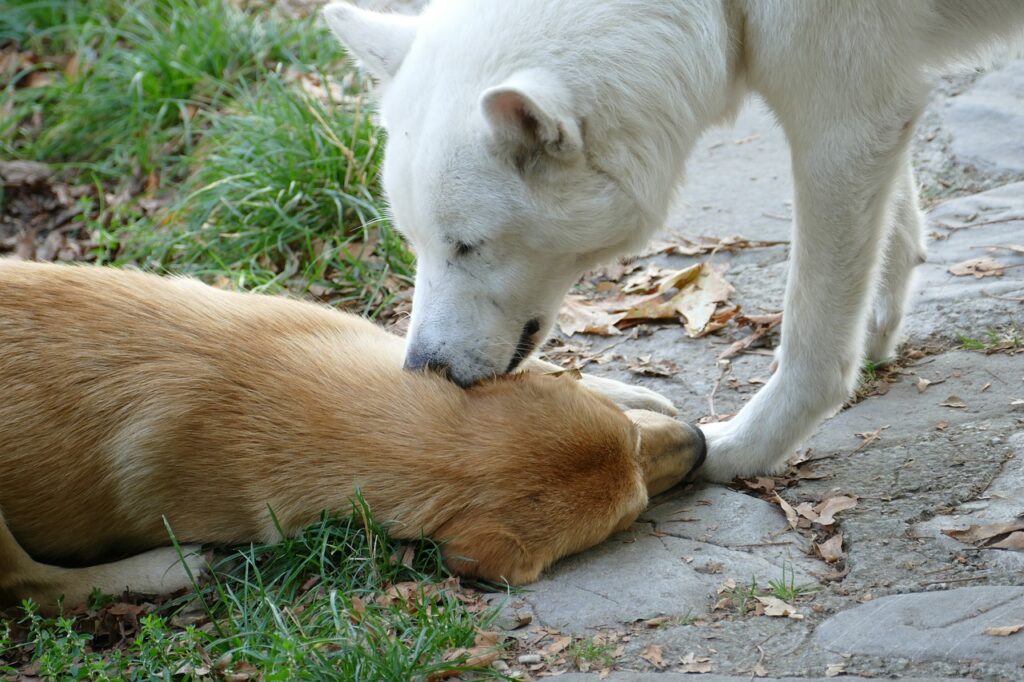We all know that dogs have a wide array of behaviors that can often leave us scratching our heads. Among these, the practice of a dog licking other dogs’ ears may seem peculiar, or even concerning, to pet owners.
The phenomenon is more common than you might think, and understanding this behavior can provide a window into your dog’s psyche and the dynamics of dog communication.
Table of Contents
Deciphering The Behavior of Dogs Licking Other Dogs’ Ears
Before you can effectively address the behavior of a dog licking other dogs’ ears, you must first understand the reasons behind it.
Let’s delve into why this behavior occurs.
The Language of Affection
Dog behavior is complex and multifaceted, often mimicking human interactions to a certain degree. Just as humans express affection through touch, dogs, too, have their unique ways of demonstrating affection.

One theory posits that licking ears is simply a sign of affection. Dogs often lick each other’s ears, faces, and bodies as a social bonding activity. This kind of behavior is most commonly seen among dogs that are already familiar with each other and share a close bond.
The Grooming Habit
Dog grooming goes far beyond maintaining a shiny coat; it can also be a social activity. Licking each other’s ears can serve as a grooming habit, helping clean areas that are difficult for dogs to reach themselves. Moreover, ear-licking might provide a comforting, soothing sensation for the dog being licked.
The Quest for Taste
Dogs, being the curious creatures they are, are attracted to different tastes and scents. The ear wax of dogs has a distinct flavor, which can potentially attract other dogs, leading them to lick each other’s ears.
Is a Dog Licking Other Dogs’ Ears a Cause for Concern?
While a dog licking other dogs’ ears can be a harmless, affectionate behavior, there are circumstances when it may become problematic.
Possible Ear Infections
If you notice your dog excessively licking another dog’s ears, it could potentially be a sign of an ear infection. Dogs can detect the distinct smell of an infection, which might lead them to lick the affected area excessively.
Dominance Behavior
Although rare, in some cases, a dog licking other dogs’ ears can be an expression of dominance. If this behavior is paired with other signs of dominance like mounting or resource guarding, it might warrant professional attention.
Obsessive Behavior
While some amount of ear licking is normal, too much can be a sign of obsessive behavior. If a dog is constantly focused on licking another dog’s ears to the point where it interferes with other activities, it might be time to consult a professional.
How to Address Excessive Ear Licking
If the ear licking behavior becomes excessive, intervention may be necessary. Here are some strategies:
-
Medical Check-up
If you suspect an ear infection, a vet check-up is crucial. The veterinarian will examine your dog’s ears for signs of inflammation, redness, or discharge.
-
Behavioral Intervention
Should the ear licking become a compulsive behavior, a professional dog trainer or a certified applied animal behaviorist could be consulted. They can help implement a plan to redirect your dog’s attention and break the cycle of obsessive behavior.
-
Positive Reinforcement
Discouraging the behavior through positive reinforcement can be an effective strategy. Rewarding your dog for not licking the other dog’s ears can make them associate the lack of action with a positive outcome.
Frequently Asked Questions (FAQs)
Why is my dog always licking my other dog’s ears?
A dog licking another dog’s ears can have several explanations. It could be an act of affection, grooming, attraction to the taste, or even a signal of an underlying medical issue.
Should I be worried if my dog licks other dogs’ ears excessively?
Excessive ear licking could indicate a problem. If it’s paired with signs of discomfort from the dog whose ears are being licked, or other worrying signs like excessive scratching, redness, or discharge from the ear, it’s worth a visit to the vet.
How can I stop my dog from licking other dogs’ ears?
You might discourage this behavior using positive reinforcement, or redirecting their attention to other activities. If the behavior persists, consult with a professional dog trainer or behaviorist.
Conclusion
Understanding the behavior of a dog licking other dogs’ ears can offer valuable insights into your pet’s health and social dynamics. While it is often a harmless act of affection or social grooming, pet owners should be vigilant for signs of excessive behavior or potential health concerns.
Ultimately, our goal is to ensure the well-being of our four-legged friends and their companions.


Dennis and Becca, have always shared a passion for man’s best friend. As dog enthusiasts, they put together articles that inform, engage, and captivate fellow dog lovers.